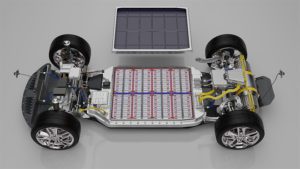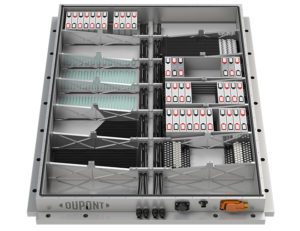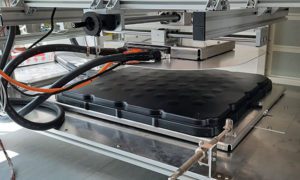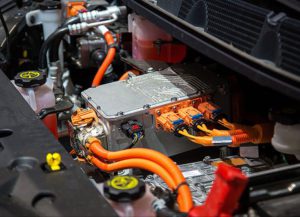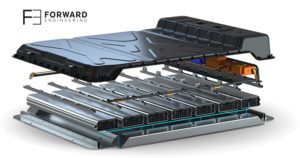In the evolving world of eMobility one thing remains constant – the inverter is the heart and soul of electric vehicles. When it comes to testing inverters, the trend has been to pull tests further up the development cycle, using virtualization to simulate components at lower costs and test scenarios faster than in-vehicle field testing…. Read more »
Search Results Found For: "Formula E"
Thermally conductive adhesives for next generation cell-to-pack configurations
Sponsored by Parker Lord With the significant growth and development of battery pack technologies, manufacturers of Electric Vehicles (EVs) are placing an increased emphasis on pack design optimization. Manufacturers seek lighter weight, yet more compact solutions to gain additional energy density and reduce cost. In parallel, they also strive for simpler and more affordable manufacturing… Read more »
Four ways DuPont adhesives and resins advance EVs
Sponsored by Dupont Much of what drives the advancement of EVs today is what you don’t see. For example, crash-worthy adhesives that bond body and battery components along with performance polymers and thermal interface materials that safely manage battery temperature. At DuPont, we’re developing adhesive and plastic solutions that help automakers worldwide produce EVs that… Read more »
Sprint Power develops components for wireless charging trial for fleet vehicles
Sprint Power, a British firm that specializes in electrified propulsion systems, power electronics and battery systems, is leading a UK government-backed project that aims to demonstrate the suitability of wireless charging technology for fleet vehicles. Funding for the wireless charging project has been provided by Innovate UK, a public body designed to drive research and… Read more »
HBK’s digital algorithm can map EV motor efficiency 10 times faster than analog systems
In order to maximize an EV’s range for a given battery capacity and vehicle weight, engineers try to eke out as much performance as possible from the electrical and mechanical systems. Using a process called efficiency mapping, they determine the “sweet spots” of a powertrain—the regions of the torque-speed curve where the system operates at… Read more »
How silicone can help to optimize reliability and accuracy of EV and ADAS sensors
Sponsored by DOW Dow Silicones Help Optimize Reliability and Accuracy of ADAS Sensors Advanced driver assistance systems (ADAS) are designed to increase vehicle safety and support autonomous driving by acting as extra sets of eyes. These sophisticated electronics help drivers spot obstacles and risks, maneuver and park more easily, take action to avoid or mitigate… Read more »
New color-stable eOrange identifies high-voltage EV components for safety
High-voltage components in EVs can be dangerous, and that’s why automakers tend to sheathe them in high-visibility orange plastic. Brüggemann, a German supplier of polymer additives and industrial chemicals, has partnered with GRAFE to develop color-stable eOrange masterbatches designed for use in injection-molded and extruded polyamide components for e-mobility. The striking pastel orange RAL2003 is… Read more »
HPQ Silicon: a project for the development of silicon-based anode materials
HPQ Silicon has announced that HPQ, PyroGenesis Canada and the Énergie Matériaux Télécommunications Centre (ETM) of the Institut national de recherche scientifique (INRS) have set up a research project focused on the development of silicon-based materials as active anodes for lithium-ion batteries. HPQ and PyroGenesis will be responsible for the production of silicon materials from… Read more »
UK firms partner to optimize battery technology using carbon nanotubes
Johnson Matthey (JM) has teamed up with CPI and Thomas Swan to explore how to best optimize battery technology. The ICE-Batt project, which receives funding support from the Faraday Battery Challenge, will investigate how carbon nanotubes (CNTs) and graphene nanoplatelets (GNPs) can improve battery performance. Ultimately this could lead to improvements in energy density, power… Read more »
New brand-independent battery housing reduces weight and costs
A consortium consisting of Lorenz Kunststofftechnik, Forward Engineering, Evonik, LION Smart, Vestaro and Minth has developed a solution to help improve EV efficiency through lightweight battery construction. In late 2019, work started on a brand-independent, low-cost housing. The resulting battery pack is expected to weigh about 10 percent less than a pack made with commonly… Read more »





